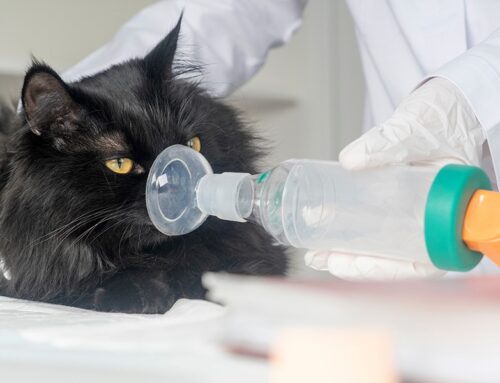Vomiting is a common issue seen in cats and dogs, but it can have many different causes, ranging from mild and self-limiting to serious and life-threatening.
Understanding why your pet is vomiting, how we diagnose the underlying problem, and the treatment options available is key to ensuring their health and well-being.
Why Do Pets Vomit?
Vomiting occurs when the stomach contents are forcibly expelled through the mouth, often preceded by retching or nausea. The causes of vomiting can be categorised into two main groups:
1. Gastrointestinal Causes:
- Dietary indiscretion (eating something they shouldn’t).
- Foreign body obstruction.
- Intestinal parasites.
- Inflammatory bowel disease (IBD).
- Gastroenteritis due to infections (bacterial or viral).
- Food allergies or intolerances.
2. Non-Gastrointestinal Causes:
- Kidney or liver disease.
- Pancreatitis.
- Toxins (e.g., chocolate, antifreeze, certain plants).
- Hormonal imbalances, such as Addison’s disease or diabetes.
- Neurological issues causing nausea (e.g., vestibular disease).
Diagnosing the Cause of Vomiting
At Forestside Veterinary Clinic, we take a systematic approach to determine why your pet is vomiting. The diagnostic process may include:
1. History and Physical Exam:
- What has your pet been eating?
- How often are they vomiting, and what does it look like?
- Are there other symptoms, like diarrhoea, lethargy, or changes in appetite?
- A thorough examination for signs of dehydration, abdominal pain, or bloating.
- If the answer is not clear from the history and physical exam or your pet seems very ill we may advise additional testing
2. Diagnostic Tests:
- Bloodwork: Checks organ function, hydration status, and potential infections.
- X-rays or Ultrasound: Identifies blockages, masses, or other abnormalities in the gastrointestinal tract.
- Fecal Analysis: Detects intestinal parasites.
- Biopsy: For chronic vomiting, these tests may help diagnose IBD or cancer.
How We Treat Vomiting
Treatment depends on the underlying cause but typically involves one or more of the following:
1. Supportive Care:
- Fluids: Rehydration via intravenous or subcutaneous fluids is crucial if your pet is dehydrated.
- Anti-nausea medications: Drugs like maropitant help control nausea and vomiting.
- Stomach protectants: Medications to soothe the gastrointestinal lining and reduce acid production.
2. Dietary Management:
- Fasting: A short period without food may be recommended to allow the stomach to settle.
- Bland diet: Easily digestible foods like boiled chicken and rice may be introduced gradually.
- Prescription diets: Special diets designed for sensitive stomachs or specific medical conditions.
3. Specific Treatments:
- Parasite control: Deworming medications if parasites are detected.
- Surgical intervention: For foreign bodies, tumours, or blockages.
- Medication: Treating underlying conditions like pancreatitis, kidney disease, or infections.
When is Vomiting an Emergency?
Contact us immediately if your pet is:
- Vomiting repeatedly or cannot keep water down.
- Showing signs of severe lethargy or collapse.
- Vomiting blood or material that looks like coffee grounds (a sign of bleeding).
- Experiencing bloating or a distended abdomen, particularly in large dogs (could indicate gastric torsion).
How to Prevent Vomiting in Pets
- Feed a high-quality, consistent diet.
- Avoid giving human foods or allowing your pet to scavenge.
- Keep toxic substances and small objects out of reach.
- Ensure routine parasite prevention and regular health check-ups.
We’re Here to Help
At Forestside Veterinary Clinic, our experienced team is dedicated to getting to the root of your pet’s vomiting and providing effective treatment to ensure a quick recovery. If your pet is experiencing vomiting, don’t wait—contact us today to schedule an appointment.



